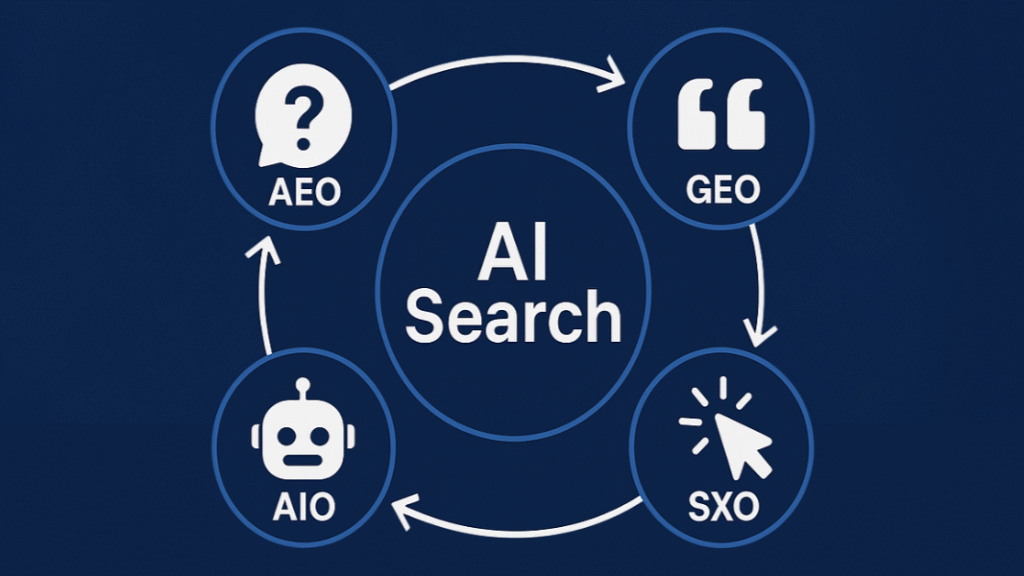Google ’s AI-powered search evolution isn’t just another algorithm update — it’s a seismic shift changing how brands need to think about visibility, engagement, and conversion. Recent research from BrightEdge and a growing body of industry insights show that AI-driven search experiences are redefining the SEO landscape, forcing marketers to adapt or risk irrelevance.
The Rise of Generative Search and GEO
BrightEdge’s survey of over 750 marketing professionals reveals that 68% of organisations are already changing their strategies to adapt to AI search, with SEO and digital marketing teams bearing the brunt of the challenge. The shift has given rise to a new discipline: Generative Engine Optimisation (GEO), strategies designed specifically to win citations and visibility in AI-generated responses from engines like Google’s Search Generative Experience, OpenAI , Perplexity , and Claude.
These AI systems don’t just rank pages; they synthesise information, choosing sources to cite or omit entirely. For marketers, this means the traditional race to page one is no longer enough — you must ensure your content is authoritative, verifiable, and structured for AI consumption.
Why SEO Teams Are More Critical Than Ever
The BrightEdge SEO data shows 54% of companies rely on SEO teams to lead AI search adaptation, far outpacing content, PR, or leadership teams. Yet this concentration of responsibility creates a double-edged sword: while SEO experts understand technical nuances, they need broader organisational support to build integrated strategies that span AI, content, and experience.
With 57% of marketers describing their outlook as “cautiously optimistic,” it’s clear businesses see both opportunity and risk in this transformation. Multi-platform strategies are gaining traction — nearly half of those adapting are optimising content not just for Google, but also for AI engines like OpenAI and beyond.
Beyond Traditional SEO: The Four-Layer Framework
Toronto-based strategist Madhav Mistry recently introduced a comprehensive four-layer SEO framework highlighting how brands must rethink optimisation in the AI era. His methodology breaks modern search optimisation into four pillars:
- Answer Engine Optimisation (AEO) – Capturing featured snippets, voice responses, and AI answer boxes through structured markup and concise, authoritative answers.
- Generative Engine Optimisation (GEO) – Crafting content likely to be cited by AI systems, focusing on citation hooks, topical depth, and prompt-led publishing.
- AI Integration Optimisation (AIO) – Automating workflows, leveraging AI tools for scalable content production, and programmatic SEO.
- Search Experience Optimisation (SXO) – Ensuring post-click experiences drive conversions through page speed, mobile usability, and intent alignment.
The framework reflects a fundamental reality: traditional SEO alone can’t deliver the visibility or performance needed in AI-driven search environments. Brands must optimise not just for rankings, but for citations, zero-click answers, and user experience signals that influence both AI and human behaviour.
The Strategic Imperative: Holistic, Cross-Functional SEO
The research and frameworks paint a clear picture: AI is making SEO professionals more valuable than ever, but it’s also exposing weaknesses in siloed marketing organisations. SEO teams cannot operate alone — they need tight integration with content creators, PR, UX designers, and leadership to build strategies that work across AI Overviews, zero-click SERPs, and multi-platform ecosystems.
For brands still observing from the sidelines, the 32% who haven’t started adapting, the window for catching up is closing fast. Competitors are moving to sophisticated, multi-layered strategies that don’t just aim for organic rankings, but secure AI citations and user engagement across diverse digital touch points.
Looking Ahead: Action Steps for Marketers
To stay ahead in this new era of AI-powered search:
✅ Prioritise structured content with schema markup to target both featured snippets and voice searches (AEO).
✅ Invest in authoritative, fact-based content designed for AI citation opportunities (GEO).
✅ Automate where possible, using AI tools to scale content production while maintaining quality (AIO).
✅ Obsess over user experience, treating post-click engagement as critical to both rankings and ROI (SXO).
✅ Break silos across SEO, content, and UX teams to build unified strategies that reflect how users search — and how AI interprets your content.
Conclusion
AI hasn’t killed SEO. Instead, it’s elevated SEO’s importance, but only for those willing to rethink their approach. Marketers who adapt now, embracing a holistic, AI-ready SEO strategy, will gain a decisive advantage in visibility, authority, and conversions as Google and other engines accelerate their AI transformations.



